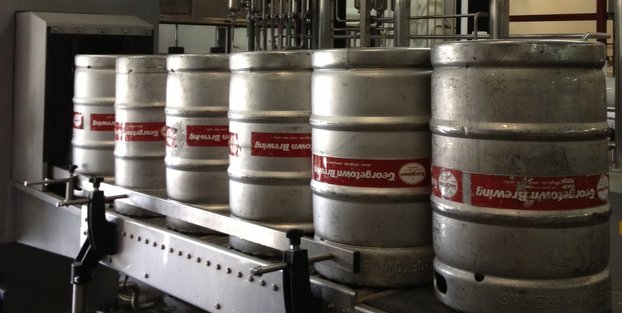
Question: What can you do if you want to brew at the commercial level but simply cannot find or afford the space to do it? Short answer: contract brewing or tenant brewing. These options seem very similar, but they are in fact completely different arrangements. What differentiates the two?
Contract brewing is a business arrangement where a brewer hires an existing brewery (a “contract brewer”) to brew and package the beer for them. In a contract brewing arrangement, the “contract brewer” is the party that has physical brewery space and often actually brews the beer. The “brewer” is the party ordering the beer. A contract arrangement is very flexible and may include many different things such as recipe development, labor and production.
In a tenant brewing arrangement, two or more parties alternate beer production in a shared space. This arrangement is, in essence, a shared space arrangement. There are totally different brewing teams that typically handle recipe development, labor and production themselves. In a tenant brewing arrangement, the only thing the two brewing teams have in common is the shared space to work.
On its face, tenant brewing appears to be a highly hands-on approach when compared to contract brewing. As the Pretty Things Beer and Ale Project puts it, “just as tenant farmers rent the land and farm it themselves, we rent a brewery, formulate and brew our beers ourselves… We supply all of the brewday labor without help from other professional brewers.” The tenant brewer maintains the responsibilities of producing the beer in the host brewer’s facility; the host brewer simply provides the space and the equipment and lets the tenant “go to town,” so to speak. The Alcohol and Tobacco Tax and Trade Bureau (TTB) classifies this type of arrangement as an “alternating brewery proprietorship.”
There are significant benefits to both business models. A contract or tenant brewing arrangement can help a young craft brewery focus on building brand identity before making a significant investment in a brick-and-mortar location, including all the overhead costs associated with that endeavor. They can also offer a viable strategy for already-established craft brewers who want to expand but have reached capacity at their current facilities.
Despite these similarities, there are significant legal differences to consider in weighing the two options. Here are some major differences to consider:
Whose beer is it?
The Internal Revenue Code defines a brewer as a person who brews beer or produces beer for sale. In order to brew beer, the brewer must have title to the ingredients.
In a contract brewing arrangement, the “contract brewer” (the owner of the brewery) has title to the ingredients and beer during production. Title to the beer passes from the contract brewer to the “brewer” (the party ordering the beer) after production, tax payment and removal from the brewery. In other words, the “brewer” who ordered the beer isn’t actually a brewer at all in this type of arrangement. Instead, the “brewer” is likely considered a wholesaler or retailer and may need to hold a permit as a wholesaler under the Federal Alcohol Administration Act.
In a tenant brewing arrangement, the tenant brewer retains the title to the ingredients and the beer throughout the production. Because the beer belongs to the tenant brewer, a tenant brewer does not need to be qualified as a wholesaler.
What record-keeping responsibilities are there?
The “contract brewer” (the owner of the brewery) is responsible for keeping records of beer production and providing operational reports to the TTB. The “brewer” (the party ordering the beer) has no responsibility for this aspect of brewing. Instead, the brewer’s record-keeping responsibilities center around acting as a retail or wholesale dealer in beer pursuant to federal regulation.
A tenant brewer is responsible for its own records of beer production and operational reports, and these records must be maintained separately from the host brewer.
Who pays the taxes?
A “contract brewer” (the owner of the brewery) is responsible for paying taxes on the beer removed from the brewery. However, the contract brewer and the “brewer” (the party ordering the beer) may enter into arrangements for compensating the contract brewer for tax or other expenses. Further, if the brewer is considered a wholesaler, they may have additional special tax requirements.
A tenant brewer pays its own tax on the beer removed from the brewery. Additionally, a tenant brewer may be eligible for a reduced rate of tax on beer for certain qualified domestic brewers under federal tax regulation.
State authorities also govern the relationship between contract brewer, brewer and tenant brewer. State licensing requirements and the responsibilities associated with each type of license add yet another layer of complexity to any multi-party brewing plan. Before entering into any type of contract or tenant brewing agreement, a brewer must not only evaluate its own manpower, expertise and time, but also think about the many regulatory, licensing and tax issues associated with commercial brewing before entering into any type of agreement. Both brewing arrangements have proven successful for many brands, but neither contract nor tenant brewing constitutes a one-size-fits-all business plan.
 Don’t stop here. Now, learn all about distribution contracts before signing your next one
Don’t stop here. Now, learn all about distribution contracts before signing your next one
Jennifer Garner is an attorney in Bowditch & Dewey LLP’s litigation practice and a member of the firm’s craft brewery group.





Taxes and recording keeping for contract brewing. Who is in charge of record keeping? Who pays taxes? http://t.co/0Fa1Gv8GuH #OBeer
Lee III liked this on Facebook.
Jerry Elliott liked this on Facebook.
Grist Mills liked this on Facebook.
#CraftBeer #CraftBrewing #Beer #BeerBiz Contract and tenant brewing: Regulatory, licensing and tax considerations http://t.co/UpxMezAOXL
Josh Arno liked this on Facebook.
South Carolina Attorneys At Law liked this on Facebook.
Jeff Platt liked this on Facebook.